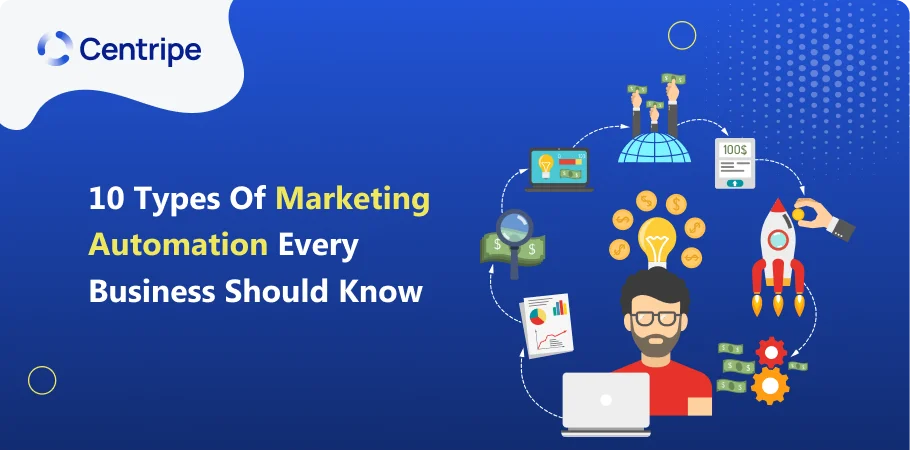Imagine running a business where your to-do list never ends—sending follow-up emails, scheduling posts, analyzing customer data—it’s overwhelming, right? That’s where types of marketing automation tools step in. It simplifies these repetitive tasks, giving you the time and focus to grow your business.
At its core, marketing automation uses technology to handle tasks like email campaigns, social media scheduling, and analyzing customer behavior. Think of it as your extra team member, working behind the scenes to make your marketing seamless and impactful. In today’s busy world, automation is essential. Tools like email and mobile marketing automation help save time, maintain consistency, and provide a personalized experience for your audience.
Take a small boutique, for instance—they used an email marketing automation tool to send personalized birthday discounts and exclusive offers. The result? Happier customers and increased sales, all without extra effort. Think how easy life would be with automation running your marketing campaigns. In this blog, we’ll explore 10 types of marketing automation campaigns every business should know. By the end, you’ll see how the right marketing automation platform can transform your business. Let’s dive in!
The Benefits of Marketing Automation
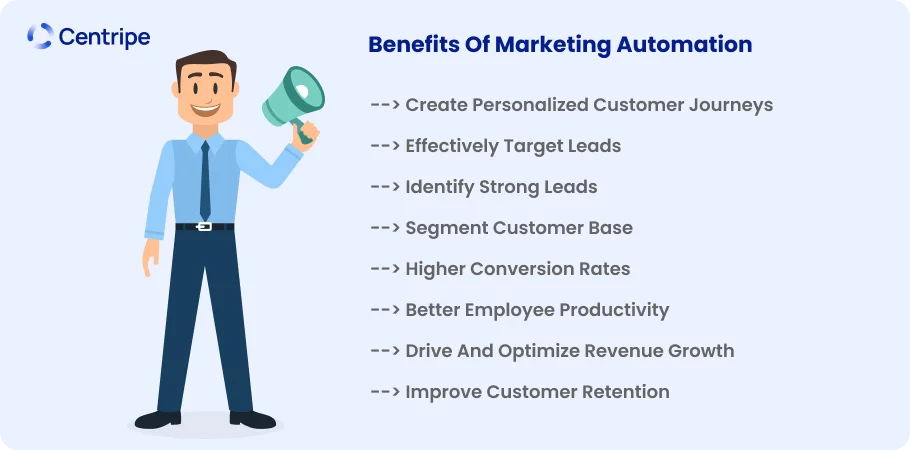
Nowadays, marketing can feel like a treadmill—no matter how hard you try, there’s always more to do. That’s where marketing automation becomes a game-changer. With the right automation tools, you can work smarter, not harder, and achieve incredible results.
1. Save Time and Resources
Think about how much of your day is spent on repetitive tasks—sending follow-up emails, scheduling social media posts, or managing campaigns. By using the best marketing automation tools for small businesses, you can automate these tasks and focus on the bigger picture, like brainstorming creative campaigns or building strong customer relationships.
For example, imagine a bakery that automates its promotional emails to remind customers of upcoming seasonal treats. Not only do they save time, but they also keep their customers engaged effortlessly.
2. Improve Personalization
Today’s customers expect more than generic messages—they want experiences tailored to their needs. With the best marketing automation software, you can create personalized campaigns that connect with your audience on a deeper level.
Whether it’s recommending products based on past purchases or sending birthday offers, automation tools allow you to build meaningful relationships. By leveraging different types of marketing automation, you can design strategies that cater to various customer touchpoints. And the best part? Personalization leads to better engagement and higher ROI.
3. Scale Your Efforts
As your business grows, so does the demand for handling more leads, customers, and campaigns. The best tools for marketing can help you scale seamlessly, managing a larger audience without needing to expand your team.
For example, a small e-commerce brand can use the best marketing automation tool for small businesses to manage thousands of customer interactions while ensuring every touchpoint feels personal.
4. Improve Consistency
Consistency is key in building trust and recognition for your brand. Using great marketing tools, you can maintain a cohesive message across all your channels—email, social media, and more. By understanding the types of marketing automation tools and how to use marketing automation effectively, you can ensure every customer gets the right message at the right time, creating a seamless experience from start to finish.
Start Your Journey with Marketing Automation
Whether you’re exploring the types of marketing automation software, integrating marketing automation tools, or leveraging artificial intelligence in marketing automation, there’s no better time to embrace these great marketing tools.
For small businesses, finding the best marketing automation tool is crucial to saving time, personalizing customer experiences, scaling efficiently, and ensuring consistent engagement.
Ready to transform your marketing? Let the right tools do the heavy lifting so you can focus on what matters most—growing your business.
10 Types of Marketing Automation for Small Businesses
1. Email Marketing Automation
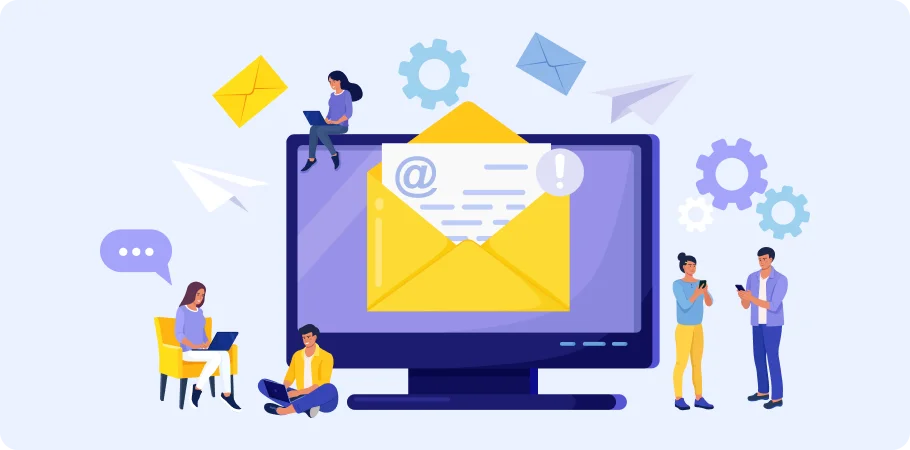
Email marketing automation streamlines email campaigns like welcome messages, lead nurturing, abandoned cart reminders, and post-purchase follow-ups. This form of marketing automation ensures personalized messaging without requiring constant manual effort.
Imagine a small boutique leveraging email marketing automation to send personalized birthday emails with discounts to their existing customers. These automated campaigns not only boost customer satisfaction but also encourage customer retention and brand loyalty.
Pro Tip: Use audience segmentation and A/B testing to craft targeted messages that resonate with different customer groups. This approach enhances engagement and helps marketers refine their marketing automation strategy.
2. Social Media Automation
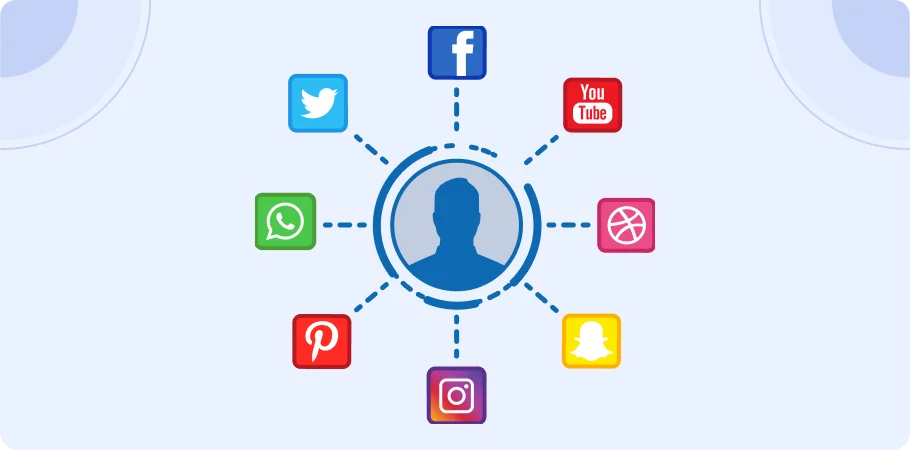
Social media automation tools simplify scheduling posts, tracking engagement, and automating responses to common customer inquiries. These tools help businesses maintain an active presence on social media platforms while focusing on other marketing activities.
A local coffee shop uses social media automation to schedule posts showcasing their seasonal specials and host giveaways. The result? Increased customer conversations and a noticeable boost in foot traffic.
Pro Tip: While automating content curation is effective, always add personal responses to build meaningful customer relationships. Authenticity fosters lasting customer relationships and improves customer engagement.
3. CRM Automation
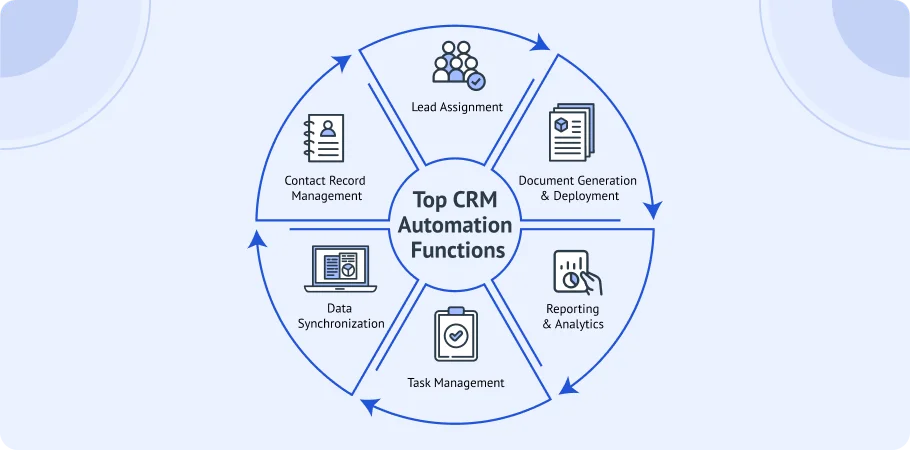
CRM automation manages customer data, lead tracking, segmentation and lead scoring so you can nurture leads and streamline your sales funnel. Integrating CRM with other tools means all customer interactions are centralised so the customer journey is seamless.
A B2B company uses CRM automation to identify high value customers and prioritise follow ups, creating a process for their sales and marketing teams to close deals faster.
Pro Tip: Combine CRM with email automation and social media campaigns for unified and effective campaigns that deliver personal experiences across multiple channels.
4. Workflow Automation
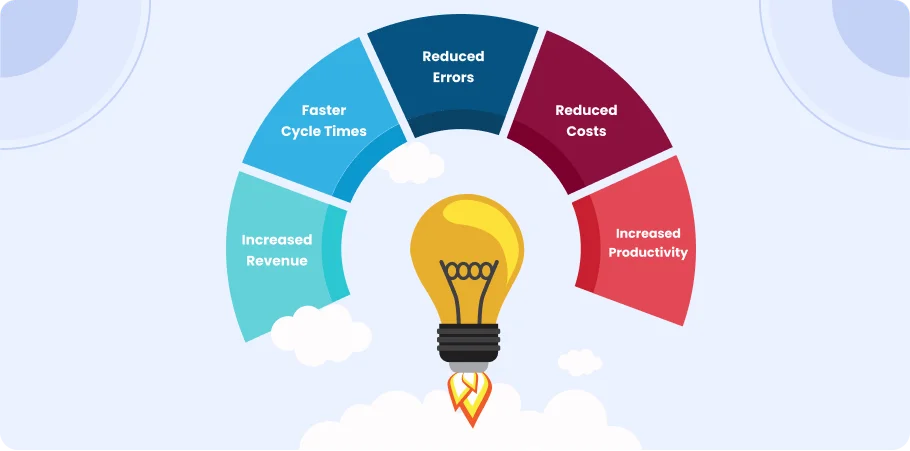
Workflow automation reduces manual tasks by automating internal processes such as task assignments, follow up reminders and project timelines. So teams can focus on strategy not manual work.
A marketing team uses an automation platform to assign tasks based on deadlines and send reminders for incomplete projects. This increases productivity and aligns efforts for successful digital marketing campaigns.
Pro Tip: Customise workflows to fit your team. By streamlining workflows you’ll collaborate better and speed up your marketing.
5. Analytics and Reporting Automation
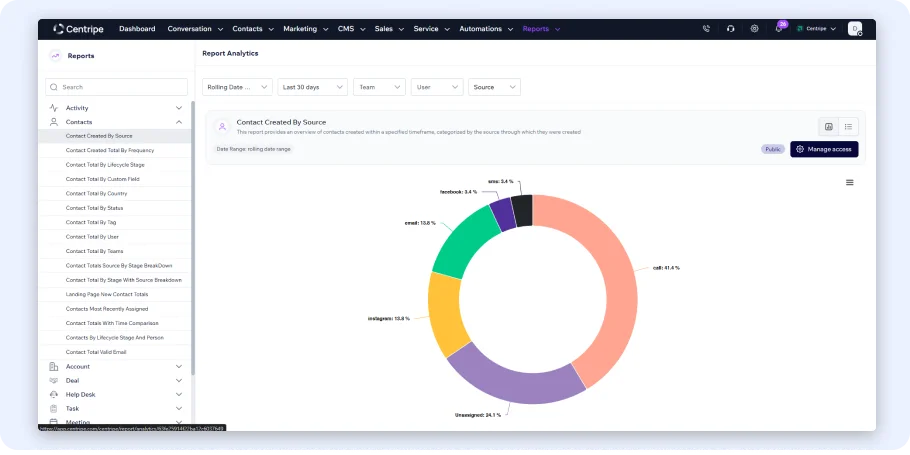
Reporting automation gives you real-time performance insights, campaign analysis and detailed metrics on website traffic, customer behaviour and sales. So you can make data driven decisions fast.
A retail brand uses automated reports to track monthly sales and review customer acquisition strategies. These insights help them spot trends and refine their marketing for better ROI.
Pro Tip: Set up automated alerts to notify you of big changes in your digital marketing or social media marketing campaigns. Action fast on insights means consistent customer satisfaction and revenue growth.
Turn Repetitive Tasks into Smart Workflows with Marketing Automation
6. Lead Scoring and Qualification Automation
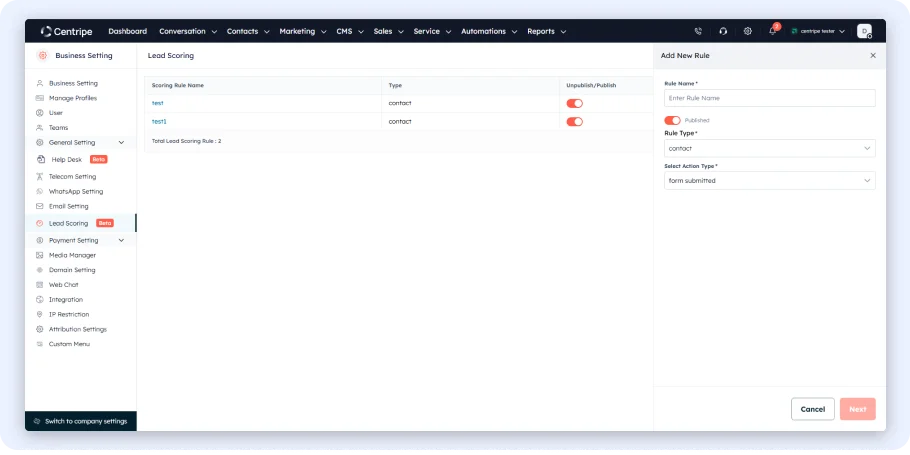
Lead scoring automation streamlines the process of ranking leads based on their behavior, demographics, and engagement levels. It uses marketing automation software to assign scores to leads based on factors like email opens, website visits, or form submissions. This automation helps prioritize high-value customers, making it easier for sales and marketing teams to focus their efforts effectively.
Imagine an online course provider. They use email marketing automation and an automation platform to track user interactions—like signing up for a free webinar or downloading a course guide. Leads with high engagement scores automatically move further down the sales funnel, triggering personalized campaigns. This ensures only qualified leads receive follow-ups, boosting conversion rates and improving customer satisfaction.
Pro Tip: Regularly refine your lead scoring criteria to align with changing customer behavior and trends. Analyze first-party customer data to identify trends, ensuring your marketing automation strategy remains effective over time.
7. Content Marketing Automation
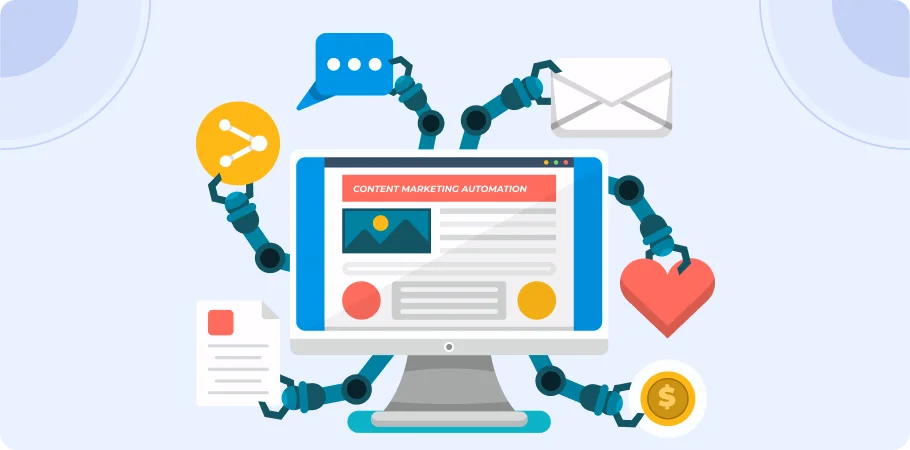
This type of marketing automation focuses on automating the scheduling, distribution, and repurposing of content across multiple channels such as blogs, social media platforms, and email newsletters. Using social media automation tools, businesses can ensure consistent content delivery without manual intervention.
Picture a SaaS business. They use a marketing automation tool to plan blog posts, schedule social media campaigns, and deliver newsletters ahead of time. By repurposing high-performing blog posts into in-app messages or infographics, they engage their audience across different touchpoints, improving customer engagement and nurturing leads.
Pro Tip: Identify high-performing content and adapt it into various formats, such as turning a detailed guide into a push notification or short video. This maximizes reach and strengthens customer relationships while streamlining marketing processes.
8. Ad Campaign Automation
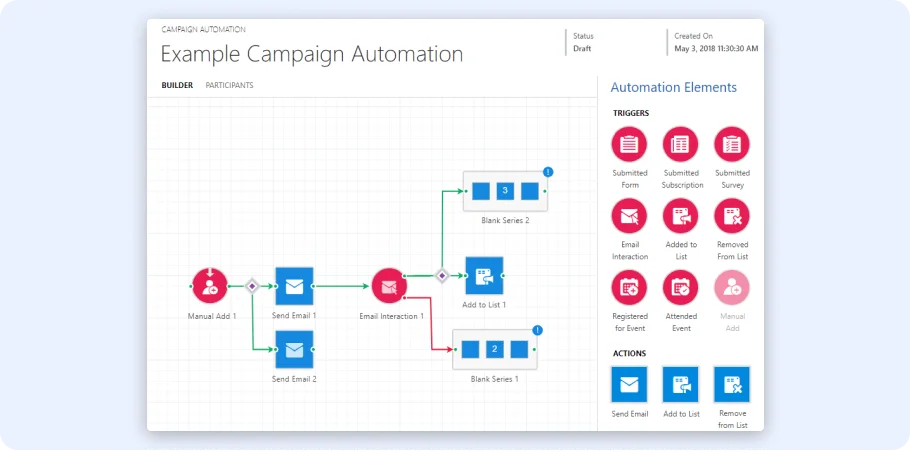
Ad campaign automation makes managing ads across multiple channels, budgets, bids and retargeting users based on their behaviour easier. It integrates with your CRM to deliver targeted messages.
A fashion brand uses automation to retarget users who visited their website but didn’t buy. Dynamic ads show personalised recommendations based on the user’s browsing history and see higher customer acquisition and revenue growth.
Pro Tip: Set up dynamic ads that adapt to user behaviour and audience segments so your digital campaigns stay relevant and effective.
9. Chatbot Automation

AI powered chatbots are a must have in modern marketing. They automate customer conversations, provide instant support for enquiries, order tracking and troubleshooting. Chatbots also analyse customer interactions to improve the overall customer journey.
A travel agency uses chatbot automation to handle booking enquiries and post purchase support. The chatbot, integrated into their marketing automation platform, delivers personalised messaging like travel recommendations or loyalty program updates to build long term customer relationships.
Pro Tip: Humanise chatbot conversations by tailoring responses to individual questions. Use marketing automation AI to create interactive and engaging dialogue for a better customer experience.
10. Event Marketing Automation
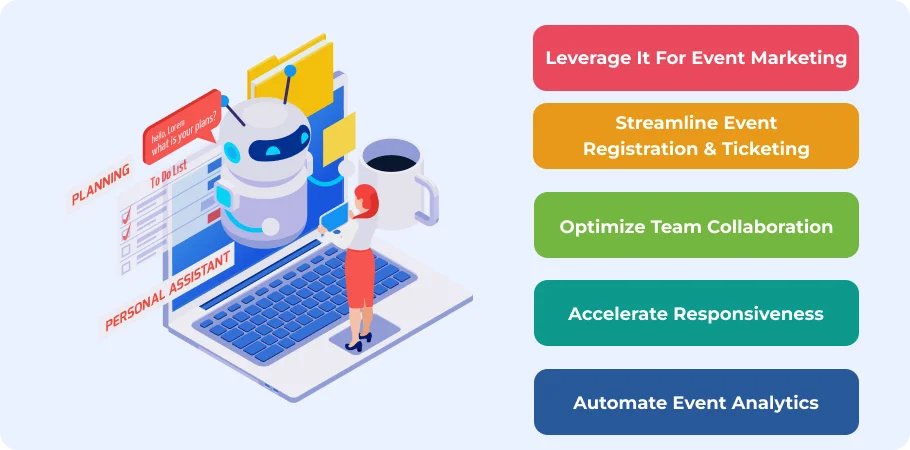
Event marketing automation manages every stage of your event from sending invitations and targeted messages to tracking registrations and following up with attendees. It ensures seamless execution across multiple channels like email, SMS and social media.
An online conference uses email campaigns to automate event invitations, reminders and post event thank you notes. They also use surveys to gather feedback to improve customer retention and brand loyalty.
Pro Tip: Use CRM automation to segment your audience for events so each attendee gets personalised communications before, during and after the event. Use data from automated campaigns to measure success and refine future marketing strategies.
Common Mistakes to Avoid
When diving into types of marketing automation, avoiding common pitfalls can make all the difference:
- Over-Automation: While automation is powerful, don’t let it strip away the human touch. Over-automated interactions can feel robotic and disengaging. Strike a balance to maintain genuine customer connections.
- Neglecting Regular Reviews: Even the best marketing automation tools for small business need periodic reviews. Ensure your automation aligns with evolving business goals and customer expectations.
- Failing to Personalize: Personalization is at the heart of successful automation. Generic, one-size-fits-all messaging won’t resonate. Use marketing automation software to tailor messages to your audience’s preferences and behaviors.
How Centripe can help you:
Centripe is your ultimate partner in achieving marketing automation success. Designed with businesses of all sizes in mind, Centripe offers a suite of tools to simplify your marketing efforts and drive results. Here’s how Centripe can help you:
- Streamlined Workflows: Say goodbye to manual tasks and hello to efficiency. Centripe automates your marketing processes, ensuring you stay consistent and effective across channels.
- Personalized Campaigns: With Centripe, you can create tailored campaigns that resonate with your audience, from email marketing to social media outreach.
- Lead Nurturing Made Easy: Manage and nurture leads effortlessly with Centripe’s CRM integration. Track every interaction, understand customer needs, and build stronger relationships.
- Advanced Analytics: Make data-driven decisions with Centripe’s powerful analytics tools. Monitor performance, optimize campaigns, and ensure every effort counts.
- Seamless Integration: Centripe works harmoniously with your existing tools, creating an ecosystem that simplifies marketing and sales collaboration.
Whether you’re a small business looking for the best tools for marketing automation or an enterprise seeking a comprehensive CRM and marketing automation platform, Centripe has everything you need to succeed.
Conclusion
Marketing automation isn’t just about saving time—it’s about creating smarter, more personalized, and scalable marketing strategies. From lead scoring and email marketing automation to social media automation tools and CRM automation, the 10 types of marketing automation we’ve discussed can transform how your business connects with its audience.
By automating repetitive tasks, delivering personalized messaging, and scaling your efforts seamlessly, you’re free to focus on what truly matters: building lasting relationships with your customers and driving growth. With an automated marketing workflow, you can ensure every customer interaction is timely and relevant.
Now’s the time to take a closer look at your current marketing efforts. Are there areas where you’re bogged down with manual work? Could a few strategic CRM and marketing automation platforms make your processes more efficient? The best tools for marketing automation can help bridge these gaps and streamline your operations.
Ready to take your marketing to the next level? Discover how Centripe can help you streamline workflows, nurture leads, and grow your business. Start your free trial today!
FAQ’s:
1. What is marketing automation?
Marketing automation uses software to streamline repetitive tasks like sending emails, scheduling social media posts, and tracking customer behavior. It helps businesses save time, improve personalization, and scale efforts.
2. How can marketing automation benefit my business?
Marketing automation helps save time on repetitive tasks, personalize customer interactions, scale your marketing efforts, and maintain consistency across all channels—making your campaigns more efficient and impactful.
3. What types of marketing automation should my business use?
Your business can use email marketing automation, social media scheduling, CRM integration, lead scoring, and more. These tools automate tasks, freeing up your time to focus on creativity and growth.
4. Can marketing automation improve customer engagement?
Yes! With personalized messages and timely responses, marketing automation helps businesses connect more deeply with customers, boosting engagement and building lasting relationships.
5. How does Centripe help with marketing automation?
Centripe simplifies your marketing by automating tasks like email campaigns, lead nurturing, and analytics. It helps you build personalized campaigns and scale your efforts seamlessly, all in one platform.
